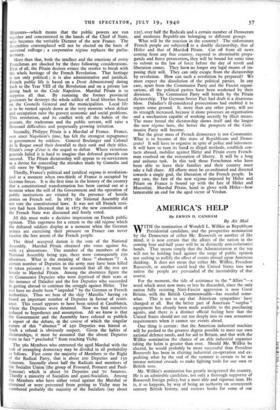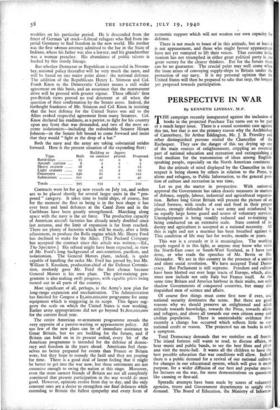AMERICA'S HELP
By ERWIN D. CANHAM
By Air Mail WITH the nomination of Wendell L. Willkie as Republican Presidential candidate, and the prospective nomination by the Democrats of either Mr. Roosevelt or another of like mind, it is now certain that the affairs of the nation in the coming four and-half years will be in distinctly non-isolationist hands. That means simply that the Administration at the top will not be holding back against the surge of public opinion nor seeking to nullify the effect of events abroad upon American thinking. It does not mean that either Mr. Willkie, President Roosevelt, or another could lead the United States into war unless the people are persuaded of the inevitability of that course.
For the moment, the tide of assistance to the " Allies "—a word which must now more or less be discarded, since the only nation fully resisting Nazi-Fascist aggression is now Great Britain, with the Bntish Commonwealth—has receded some- what. This is not to say that American sympathies ' have changed at all. But the better part of American " surplus " equipment has already been made available to the purchasing agents, and there is a distinct official feeling here that the United States should not cut too deeply into its own armament requirements when it cannot see events ahead.
One thing is certain: that the American industrial machine will be pushed to the greatest degree possible to meet our own national defence needs, and for aid to Britain, and that with the Willkie nomination the chance of an able industrial organiser taking the helm is greater than ever. Should Mr. Winkle be elected, he would probably be more successful than President Roosevelt has been in eliciting industrial co-operation and ex- pediting what by the end of the summer is certain to be an intense national crusade to make fighting tools for our own or British uses.
Mr. Willkie's nomination has greatly invigorated the country. He is an admirable candidate, not only a thorough supporter of Roosevelt foreign policy, but a most able and vigorous man. He is, it so happens, by way of being an authority on seventeenth century British history, and reviews books for some of our weeklies on his particular period. He is descended from the finest of German '48 stock—Liberal refugees who fled from im- perial Germany to find freedom in the new world. His mother was the first viaman attorney admitted to the bar in the State of Indiana, where his father was also a lawyer, and his grandmother was a woman preacher. His abundance of public talents is backed by this sturdy lineage.
But whether Democrat or Republican is successful in Novem- ber, national policy thereafter will be very much the same, and will be based on on. major point alone : the national defence. The addition of the Republicans Henry L. Stimson and Col. Frank Knox to the Democratic Cabinet means a still wider agreement on this basis, and an assurance that the rearmament drive will be pressed with greater vigour. These officials' firm pro-British views proved no real deterrent at all when the question of their confirmation by the Senate arose. Indeed, the forthright frankness of Mr. Stimson and Col. Knox in insisting that the best defence for the United States was aid to the Allies evoked respectful agreement from many Senators. Col. Knox declared his readiness, as a patriot, to fight for his country upon any front that was demanded, and two of the most ex- treme isolationists—including the redoubtable Senator Hiram Johnson—in the Senate felt bound to come forward and insist that they would " fight at the drop of a hat."
Both the navy and the army are taking substantial strides forward. Here is the present
Type. Battleships Aircraft carriers Heavy cruisers Light cruisers Destroyers Submarines Totals
situation of the expanding fleet:
Building or Appro- Built. Proposed. on contract priated. io 15 9 6 2 3 5 18 4 0 12 19 15 2 12 236 61 0 122 IOI 41 0 40 395 133 5 200
Contracts were let for 45 new vessels on July ist, and orders are to be placed shortly, for several larger units in the " pro- posed " category. It takes time to build ships, of course, but for the moment the fleet in being is in the best shape it has ever been and land defences at the Canal Zone and in the Caribbean have been greatly strengthened. Marching along apace with the navy is the air force. The productive capacity of American aircraft factories has already nearly doubled since last autumn, and the limit of expansion is far from reached. There are plenty of factories which will be ready, after a little adjustment, to produce the Rolls engine which Mr. Henry Ford has declined to make for the Allies. [The Packard Company has accepted the contract since this article was written.—Ed., The Spectator.] His refusal might have been expected, in view of Mr. Ford's long background of anti-semitism, pacifism, and isolationism. The General Motors plant, indeed, is quite capable of handling the order Mr. Ford has passed by, but Mr. William S. Knudsen, production-chief of the Defence Commis- sion, modestly gave Mr. Ford the first chance because General Motors is his own plant. The pilot-training pro- gramme is also making swift progress, with capable pilots being turned out in all parts of the country.
Most significant of all, perhaps, is the Army's new plan for long-range expansion and mechanisation. The Administration has finished for Congess a $5,000,000,000 programme for army equipment which is staggering in its scope. This figure sug- gests the scale on which the United States is now working. Earlier army appropriations did not go beyond $r,800,000,000 for the current fiscal year.
The entire American re-armament programme reveals the very opposite of a passive-waiting or appeasement policy. All too few of the new plans can be of immediate assistance to Great Britain, but we are building for the future, and if Britain can hold on in its present ordeal, every bit of the American programme is intended for the defence of democ- racy and freedom in the years ahead. Americans feel them- selves no better prepared for events than France or Britain were, but they hope to remedy the fault and they are praying for time. There is a good deal of latent feeling that it might be better to get into the war now, but these sentiments are not extensive enough to swing the nation at this stage. Moreover, even the most earnest friends of Britain are not all completely convinced that present participation in the war would de most good. However, opinions evolve from day to day, and the only constant ones are a desire to strengthen our final defences while extending to Britain the fullest sympathy and every form of
economic support which will not weaken our own capacity for defence.
There is not much to boast of in this attitude, but at least it is not appeasement, and those who might favour appeasement have not yet ventured to lift their voices. That extreme isola- tionism has not triumphed in either great political party is one great victory for the clearer thinkers. But for the future there can be no guarantee. The crucial point may well come when the issue arises of convoying supply-ships to Britain under the protection of our navy. It is my personal opinion that the United States will then be prepared to take that step, the longest yet proposed towards participation.



































 Previous page
Previous page